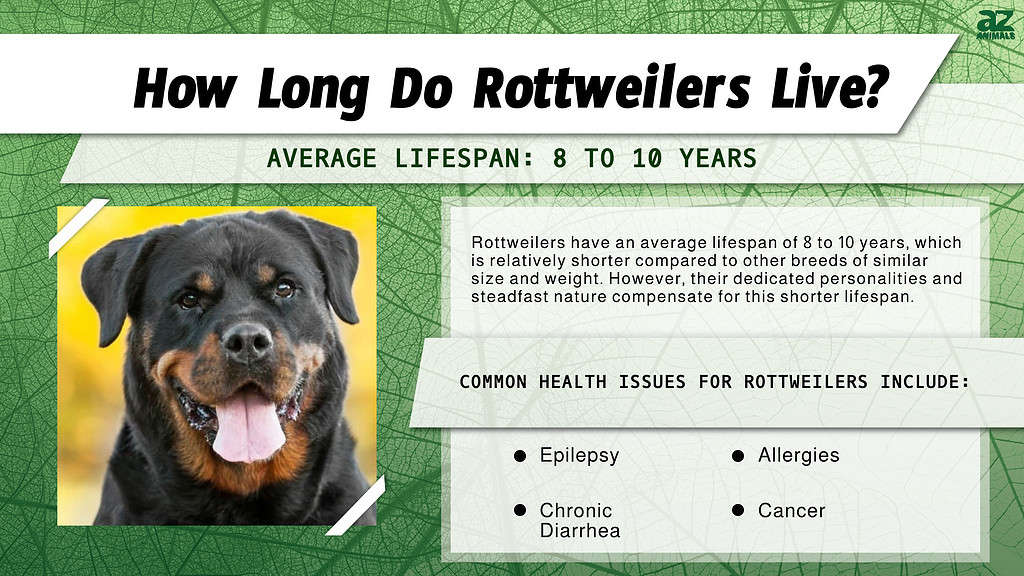
Looking for an obedient, yet self-assured family protector? Then the rottweiler is the perfect dog for you. This breed of dog is known for its shiny black double coats, tan colorings, and strong stature. Rottweilers were among some of the earliest police dogs and even lived long lives serving in the military!
These dogs were known in Germany for herding livestock and pulling meat carts. They were chosen for this thanks to their build, which ranges from medium to large. Adapting throughout the years, Rottweilers have proven themselves to be hard workers. They are also guardians of the ones they love most.
So if you happen to love dogs, love learning about them, or are looking to adopt a Rottweiler, then read on! We’ll discuss Rottweiler lifespan and how they go from puppy to adult in their amazing life cycle.
How Long Do Rottweilers Live?

Rottweilers can live for as long as 10 years.
©Rita_Kochmarjova/Shutterstock.com
The average Rottweiler lifespan is between 8-10 years. Although the Rottweiler lifespan is shorter than other breeds of the same size and weight, these dogs make up for it with their dedicated personalities and steadfastness. As expected, the life expectancy of any pet is truly reliant on how well you choose to take care of them.
Interestingly enough, female rottweilers tend to outlive males by about 10 months. In the study, “Exceptional longevity in female Rottweiler dogs is not encumbered by investment in reproduction,” no link was found between a mother’s physiological investment in her children and reduced longevity. Rather, the data indicated an inverted U-shaped pattern, comparable to research in adult women, indicating that modest investment in reproduction may increase lifespan.
As with many different breeds, each one is susceptible to disorders that only affect that specific one. With rottweilers, they can be affected by hip dysplasia or obesity. However, with regular checkups and a healthy diet, these gorgeous dogs can live an outstandingly long life.
Now that we understand the Rottweiler lifespan, let’s learn more about their life cycle.
The Average Rottweiler Life Cycle
As with all dogs, the Rottweiler life cycle goes through 4 main stages. We’ll explore these life stages in detail so you have all the knowledge you need to own a Rottweiler.
Puppies

descended from ancient Roman dogs.
©Rita_Kochmarjova/Shutterstock.com
The puppy stage of Rottweilers begins when they are born and continues until 18 months of age. The first 8 weeks of a Rottweiler’s life is incredibly important and should be spent with their mother. As with all dog breeds, they are born blind and deaf. Since they are unable to regulate their body temperature, their mother plays an important role in their growth and development.
Adolescent Stage
Rottweilers at this stage of their lives are often referred to as being in their “teenage years.” Training during this period is especially important. Rottweilers are incredibly obedient but can also be quite the handful without the proper training. Having your Rottweiler begin its training throughout this stage of its life cycle will ensure that once they’ve reached adulthood, they will already have all the proper knowledge they need to be amazing family dogs.
Adulthood
Once adulthood is reached, the Rottweiler becomes much easier to handle. Having gone through the proper training earlier, this is the perfect opportunity to find activities and hobbies that they enjoy. Whether it’s swimming or hiking, this incredible breed loves the outdoors and will have the most energy at this stage in its life. Rottweilers love mental stimulation and exercise and will become incredibly confident in their ability to protect you and your family.
Senior
Once they reach the senior stage, a Rottweiler tends to have less energy and is not as interested in running. They may instead enjoy a quiet stroll. Ensuring you have regular vet checkups is crucial at this point for your Rotties wellbeing. Adding supplements and changing your Rottweiler’s diet can make them live longer, since certain foods may be harder for them to digest as they age.
How To Extend The Life Of Your Rottweiler
Although we stated before in the article that the typical Rottweiler life expectancy is lower than that of other dogs of the same weight and size, this does not mean that these dogs cannot live happy and healthy lives.
Here are some of the top tips that can be used to help keep your pet Rottweiler around for a long time:
- Diet & Nutrition. A poor diet can affect your Rottweiler’s skin and coat, resulting in flaky skin. Adult Rottweilers rely on a high protein diet as well as carbohydrates. Incorporating foods such as sweet potatoes and berries can drastically improve their health. One thing to remember as they become older is not to overfeed them more than twice a day.
- Supplements. Veterinarians recommend supplements such as glucosamine for Rottweilers to prevent certain health problems, such as hip dysplasia.
- Mental Stimulation. Rottweilers love to work and complete tasks. Because of this, mental stimulation is crucial for this breed. Providing them with jobs to do like herding, obedience training, and toys can prevent destructive behavior and leave them feeling fulfilled.
- Grooming. The beautiful thing about Rottweilers is that due to their short hair, they seldom get fleas or ticks. Brushing them on a regular basis helps keep their blood circulation strong. Using shampoos and conditioners designed specifically for their coats will keep them looking bright and healthy.
- Regular Exercise. Rottweilers require at least 2 hours of exercise every day. Walks twice a day not only aid with mental stimulation, as noted above, but also contribute significantly to their well-being. When your dog is overweight, it is much more difficult for him to exercise, and he may become lethargic. Obese dogs might develop heart illness, skin disease, arthritis, diabetes, and respiratory difficulties.
The photo featured at the top of this post is © iStock.com/Meagan Jenkins
Ready to discover the top 10 cutest dog breeds in the entire world?
How about the fastest dogs, the largest dogs and those that are -- quite frankly -- just the kindest dogs on the planet? Each day, AZ Animals sends out lists just like this to our thousands of email subscribers. And the best part? It's FREE. Join today by entering your email below.
Thank you for reading! Have some feedback for us? Contact the AZ Animals editorial team.






